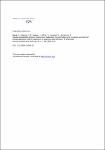Giardia duodenalis arginine deiminase modulates the phenotype and cytokine secretion of human dendritic cells by depletion of arginine and formation of ammonia
Banik, Stefanie
Viveros, Pablo Renner
Seeber, Frank
Klotz, Christian
Ignatius, Ralf
Aebischer, Toni
Depletion of arginine is a recognized strategy that pathogens use to evade immune effector mechanisms. Depletion depends on microbial enzymes such as arginases, which are considered virulence factors. The effect is mostly interpreted as being a consequence of successful competition with host enzymes for the substrate. However, both arginases and arginine deiminases (ADI) have been associated with pathogen virulence. Both deplete arginine, but their reaction products differ. An ADI has been implicated in the virulence of Giardia duodenalis, an intestinal parasite that infects humans and animals, causing significant morbidity. Dendritic cells (DC) play a critical role in host defense and also in a murine G. duodenalis infection model. The functional properties of these innate immune cells depend on the milieu in which they are activated. Here, the dependence of the response of these cells on arginine was studied by using Giardia ADI and lipopolysaccharide-stimulated human monocyte-derived DC. Arginine depletion by ADI significantly increased tumor necrosis factor alpha and decreased interleukin-10 (IL-10) and IL-12p40 secretion. It also reduced the upregulation of surface CD83 and CD86 molecules, which are involved in cell-cell interactions. Arginine depletion also reduced the phosphorylation of S6 kinase in DC, suggesting the involvement of the mammalian target of rapamycin signaling pathway. The changes were due to arginine depletion and the formation of reaction products, in particular, ammonium ions. Comparison of NH4+ and urea revealed distinct immunomodulatory activities of these products of deiminases and arginases, respectively. The data suggest that a better understanding of the role of arginine-depleting pathogen enzymes for immune evasion will have to take enzyme class and reaction products into consideration.
No license information
Related Items
Show related Items with similar Title, Author, Creator or Subject.
-
2010-10-31ZeitschriftenartikelDirect Visualization of Peptide/MHC Complexes at the Surface and in the Intracellular Compartments of Cells Infected In Vivo by Leishmania major Muraille, Eric; Gounon, Pierre; Cazareth, Julie; Hoebeke, Johan; Lippuner, Christoph; Davalos-Misslitz, Ana; Aebischer, Toni; Muller, Sylviane; Glaichenhaus, Nicolas; Mougneau, EvelyneProtozoa and bacteria infect various types of phagocytic cells including macrophages, monocytes, dendritic cells and eosinophils. However, it is not clear which of these cells process and present microbial antigens in vivo ...
-
2010-05-17ZeitschriftenartikelSuperior antigen cross-presentation and XCR1 expression define human CD11c+CD141+ cells as homologues of mouse CD8+ dendritic cells Bachem, Annabell; Güttler, Steffen; Hartung, Evelyn; Ebstein, Frédéric; Schaefer, Michael; Tannert, Astrid; Salama, Abdulgabar; Movassaghi, Kamran; Opitz, Corinna; Mages, Hans Werner; Henn, Volker; Kloetzel, Peter-Michael; Gurka, Stephanie; Kroczek, RichardIn recent years, human dendritic cells (DCs) could be subdivided into CD304+ plasmacytoid DCs (pDCs) and conventional DCs (cDCs), the latter encompassing the CD1c+, CD16+, and CD141+ DC subsets. To date, the low frequency ...
-
2010-07-08ZeitschriftenartikelLegionella pneumophila induces human beta Defensin-3 in pulmonary cells Scharf, Stefanie; Vardarova, Kremena; Lang, Friederike; Schmeck, Bernd; Opitz, Bastian; Flieger, Antje; Heuner, Klaus; Hippenstiel, Stefan; Suttorp, Norbert; N'Guessan, Philippe DBackground: Legionella pneumophila is an important causative agent of severe pneumonia in humans. Human alveolar epithelium and macrophages are effective barriers for inhaled microorganisms and actively participate in the ...

